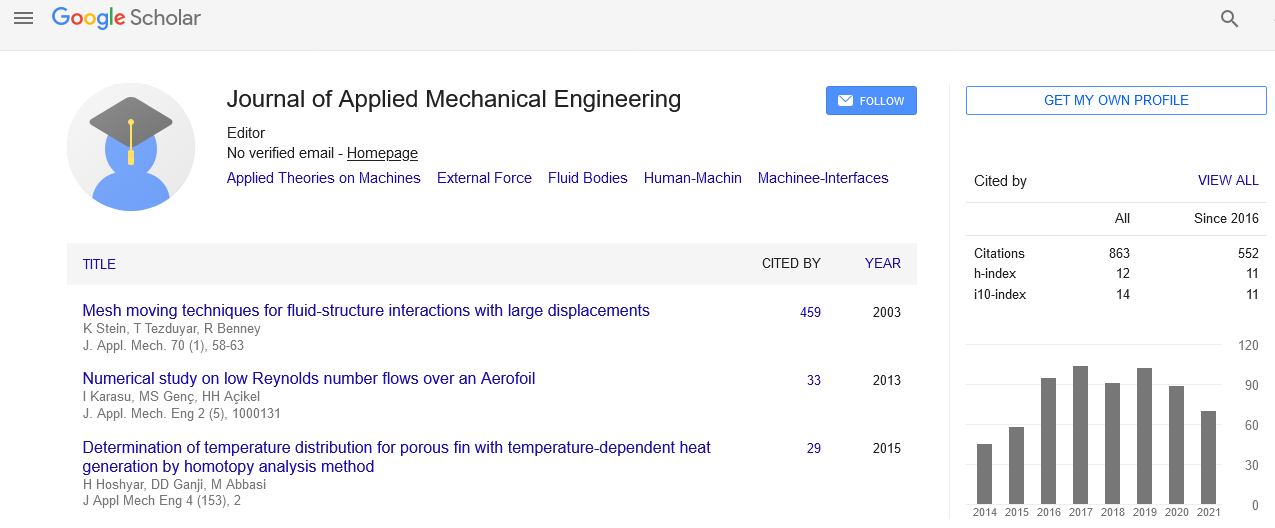Indexed In
- Genamics JournalSeek
- JournalTOCs
- CiteFactor
- RefSeek
- Hamdard University
- EBSCO A-Z
- OCLC- WorldCat
- Publons
- Google Scholar
Useful Links
Share This Page
Journal Flyer

Open Access Journals
- Agri and Aquaculture
- Biochemistry
- Bioinformatics & Systems Biology
- Business & Management
- Chemistry
- Clinical Sciences
- Engineering
- Food & Nutrition
- General Science
- Genetics & Molecular Biology
- Immunology & Microbiology
- Medical Sciences
- Neuroscience & Psychology
- Nursing & Health Care
- Pharmaceutical Sciences
Traditional and innovative methodologies (UAV-based) for the study of the dynamics of atmospheric aerosols
2nd International Conference on Fluid Dynamics & Aerodynamics
October 19-20, 2017 | Rome, Italy
R Alberto Bernabeo
Abu Dhabi University, UAE
Scientific Tracks Abstracts: J Appl Mech Eng
Abstract:
Measurements of near-surface gradients in trace gas and aerosol particle concentrations have been limited to studies conducted from fixed location towers or tethered balloons. Moreover, the third spatial coordinate (whatever the height or atmospheric thickness is considered) is usually neglected, leaving a significant gap in aerosol properties. Furthermore, taking measurements close to pollutant sources may not always be possible and it could be too dangerous or risky for manned aircraft to fly close to the ground. These reasons promote the use of small, lightweight UAVs for a range of applications, including atmospheric measurements. Small Unmanned Aerial Vehicles (UAVs) offer new opportunities to air pollution and atmospheric studies. However, there are a number of critical design decisions which need to be taken in order to enable representative data collection, which are a function of UAV motion, propellers and principle/mechanisms of the probes to be mounted on them. The research will include at least a series of different tests: (1) evaluation of the air flow behavior of a multicopter, its downwash and upwash effect, by measuring air speed along three axes to determine the location where the sensors should be mounted; (2) evaluate the use of gas sensors for CO2, CO, NO2 and NO and the Particle Number Concentration (PNC) monitor to assess their efficiency and performance in a stand-alone situation (by comparing their results with those from reference or at least traceable standard instrumentation) as well as on board of the UAV. The experimental results will be therefore analyzed in depth with the aim of producing a reliable experimental protocol for UAV-based validated data and possibly to set the basis for experimental guidelines in this field. Such research should be undertaken before any UAV system is developed for real world data collection.
Biography :
R Alberto Bernabeo is a Doctor in Aeronautical Engineering, in Physics of the Earth System, in Geography and Territorial Processes, in Environmental Sustainability and in the Science of Education with a solid background as Airline Pilot and Instructor. His current research areas are related to the impact of climate change and weather on air transport in the UAE: reduction of CO2 emissions as well as studying and testing of a green trainer to transform small general aviation aircraft for training into no-emission aerial vehicles and finally volcanic eruptions detection by RPAS/UAV of chemical composition of particles with direct threat to the safety of aircraft in flight and health effects on human beings.

